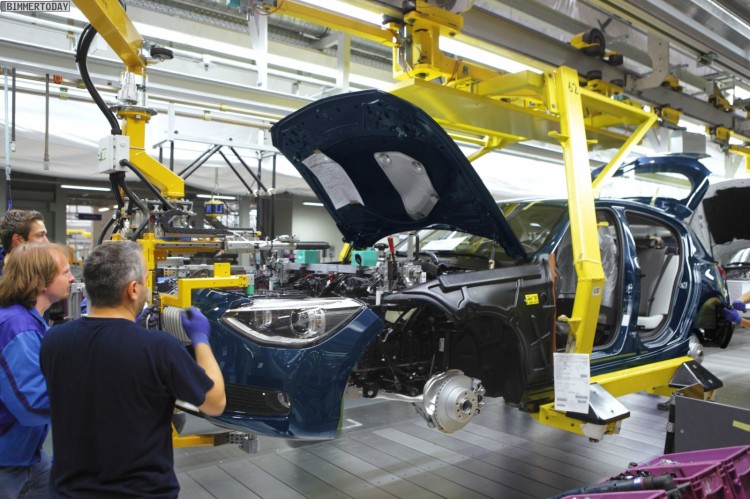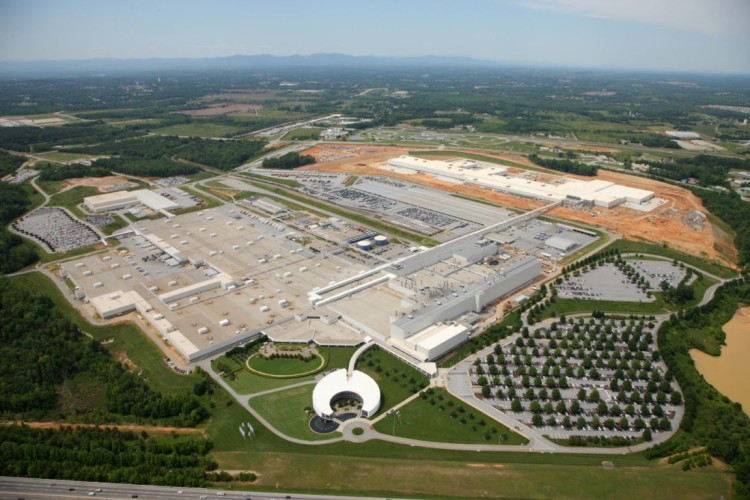With the end of the year fast approaching, it is apparent that the BMW Group’s production network will be posting new record highs for the business year 2015. Due to the high customer demand and the launch of numerous new models, such as the new BMW 7 Series, the international plant network has shown an excellent capacity utilization. Oliver Zipse, Member of the Board of Management of BMW AG, Production, is satisfied with the performance: “The BMW Group’s two-millionth car rolled off the assembly lines back in November. And 2015 marks the fifth time in a row that our German plants have produced well over one million vehicles a year.”
At the heart of the BMW Group’s production system are robust and highly flexible manufacturing processes. As a next step to further enhance these strengths, the company is planning to make each plant a production site for either the front-wheel or rear-wheel drive architecture only. Oliver Zipse: “This move is going to take the productivity of our production network to a whole new level. By focusing on one architecture, the plants can increase efficiency while reducing complexity. We aim at implementing this process as we introduce our new models over the next three years.”
Digitization strengthens innovation
Drawing on their great innovative capacity, the BMW Group’s German plants assume a leading role within the network, setting trends for their global network partners. Numerous examples throughout the production network show just how innovative the BMW Group’s production system is. These include digitization, process modules and intelligent mixed-material construction as key characteristics of the network’s future viability. Digitization in particular, which has entered the public debate under the term ‘Industrial Internet’, has a major share in increasing the adaptability of production facilities and in facilitating considerable efficiency and quality improvements. IT-supported technologies can make complex sequences in production even more effective by applying flexible robot systems, intelligent tools to support the workers, simulations, automated data recording and analysis, etc.
To ensure the German plant’s ability to meet future demands in the long term, the BMW Group is going to invest more than one billion euros in the existing sites during the next years:
By mid-2017, the home plant in Munich will be equipped with an innovative paint line that meets the highest standards in terms of both its profitability and the efficient use of resources. The new facility is part of a comprehensive investment program of over half a billion euros to be invested by 2018 with the aim of preparing the plant for future challenges. The investment package also comprises an expansion of the areas body-in-white, assembly and logistics.
During the last three years the BMW Group has invested more than half a billion Euros in new efficient production technologies for the new BMW 7 Series alone at Germany’s biggest production location in Dingolfing. With new technologies such as CFRP and electrification the production plant has become fit for the future. Also this and next year investments amounting to hundreds of millions of Euros will be made to prepare the plant for future vehicle models and technologies.
At the Landshut plant, the BMW Group has made three-digit million investments in 2015 to facilitate component production for BMW models and to further develop structures. By the end of 2016 the construction of the new BMW Group lightweight center will have been finished with an investment volume of 20 million Euros.
The company is furthermore investing a total of 100 million euros in its motorcycle production site in Berlin, where existing plant structures are being expanded and new viable structures established. 50 million Euros alone are earmarked for a new logistics center, scheduled to start operations in late 2017.
Continuing internationalization of the production network
Another priority is the investment in setting up new and stepping up existing global production capacities, a commitment to continuing the BMW Group’s successful track record. A globally connected and flexible production network is the prerequisite of further growth and key to balanced value creation.
The BMW Group will be investing a total of 2.2 billion US dollars in the NAFTA region by 2019. At present, a state-of-the-art body-in-white facility is being erected at the BMW Group’s plant in Spartanburg, SC (USA); the new construction is part of a one billion dollar investment program initially announced in 2014. This year, the production site’s annual output is going to reach a new record high of over 400,000 units, making the Spartanburg plant the largest site in terms of production volume in the BMW Group’s network. About one in five BMWs is produced in Spartanburg.
Another one billion US dollars is being spent on the new plant in Mexico. The groundbreaking ceremony has been scheduled for the summer of 2016, the start of series production for 2019.
200 million US dollars are invested into the joint venture SGL Automotive Carbon Fibers in Moses Lake, WA (USA) which operates a carbon fiber plant.
With the plants in the US, Mexico and Brazil, the BMW Group will in future have substantial production capacities in North and South America at its disposal.
In January 2016, the joint venture BMW Brilliance Automotive Ltd. (BBA) opens its new engine plant in China. The new facility, which also includes a foundry, is going to make drivetrains for the BMW vehicles produced at the BBA vehicle plants Dadong and Tiexi in its immediate vicinity. Consequently, engine plant’s capacity will be determined based on the production volume of the two automotive plants.







































































